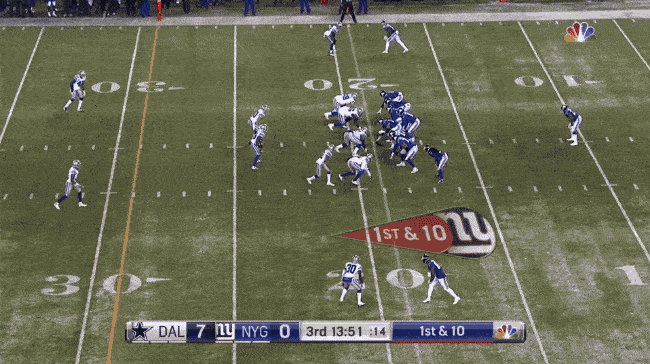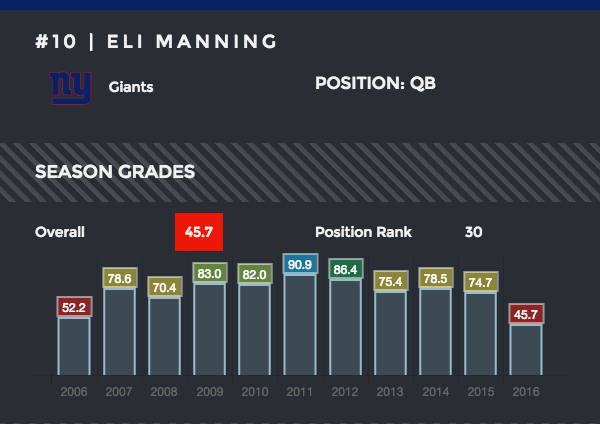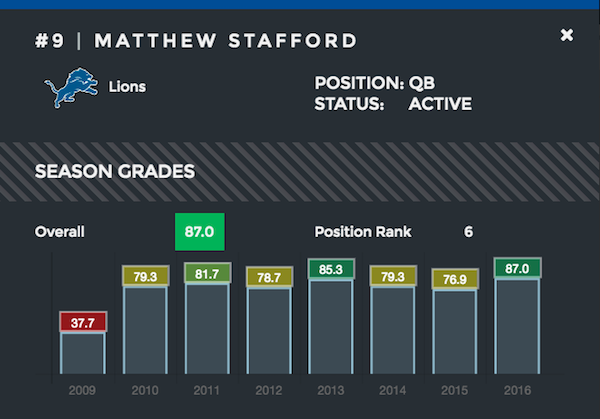In Week 15, the Detroit Lions and New York Giants will meet in a battle of 9-4 teams with two very different stories surrounding their seasons.
The Giants have managed to suddenly put together an extremely good roster, but find themselves hampered by their quarterback—a player that has been instrumental in winning two Super Bowl rings—while the Lions are being propped up by theirs, as Matthew Stafford is enjoying the best season of his career.
Career-worst season for Eli Manning?
Because of what’s to follow, it’s worth stating up front that Eli Manning’s 2011 season was one of the best QB displays of the last 10 years. Manning was consistently fantastic that season, performing incredibly well in spite of an overwhelming volume of pressure coming from a terrible offensive line in front of him. Over the span of that season, Manning was pressured on 39.1 percent of his dropbacks, yet he still maintained a passer rating of 80.9 when hurried, and if anything, only got better in the playoffs. The Giants likely wouldn't have even come close to a ring that year without Manning.
The 2011 season, though, represents the high-water mark of his career, and since that season, his PFF grade has declined steadily to a career-low mark in 2016. Manning has earned a grade lower than even that of his rookie season, which was a not a good year in its own right.
Manning is currently the league’s 30th-highest-graded QB, sitting neatly between Colin Kaepernick and Josh McCown, two spots ahead of Rams rookie Jared Goff. This is not illustrious company.
Manning’s box-score numbers look better than that, however, and this is one of those situations where it becomes difficult to show statistically why he has such a poor grade when none of the conventional QB stats point readily to it. His passer rating of 87.8 is 15.0 points higher than McCown's, and more than 20.0 points higher than Goff's. Manning has completed 62.9 percent of his passes, while others are mired in the 50.0s, and he has thrown 23 touchdowns to 13 interceptions, a respectable—if not stellar—ratio. The issue, though, is with the plays that haven’t found their way into the right statistical category because of other players failing to make the play.
Manning came out of the second game against Dallas with just one interception to his name, but it should have been at least three, and possibly four. He threw a pass directly to a Cowboys' defender, and if you pause the tape at the right moment, he has the ball cleanly in his hands before somehow conspiring to lose the handle on it all by himself as he went to ground. There is no defending that play, and the only recourse to anybody wanting to dismiss it is simply, “It didn’t count, so it didn’t happen,” even though the video suggests otherwise.

Against Dallas alone last week, Manning made six “turnover-worthy plays’ (plays that PFF grades at -1.0 or worse in our cumulative grading system). For the season, he has 29 such plays, more than any other quarterback in the league after Arizona’s Carson Palmer.
Manning makes a turnover-worthy play on 3.5 percent of his snaps, the fourth-highest figure in the league this season, and more than one-and-a-half times above the league average. Tom Brady has made such a play on 0.8 percent of his snaps this season for the league’s best mark, while Matthew Stafford has committed such errors 1.8 percent of his snaps.
Whether those plays have actually resulted in the turnovers or not, whether they deserved to each time is a different matter, and one that relies more on luck and the input of defenders than it does Manning’s play. Unless we want to seriously make the case that Manning targets defenders he knows can’t catch—and even then, he probably shouldn’t be throwing directly to them as much as to the receiver in their coverage–we probably have to accept that the numbers don’t fairly reflect the magnitude of the QB's negative play this season.
Ironically, if Manning was playing respectably this season, the Giants would be legitimate Super Bowl contenders, because the rest of the roster has suddenly come together extremely well. The free-agent spending spree seems to have worked out almost man for man. Defensive end Olivier Vernon is second in the league with 72 total QB pressures, one behind Khalil Mack and tied with Von Miller. His run defense has been excellent, even if eclipsed by the utter brilliance of nose tackle Damon Harrison in that area. Up the middle, Harrison has seven more defensive stops than any other DT in the league this season, 12 more than Los Angeles' Aaron Donald, and continues to lead the league in run-stop percentage—a statistic that may as well be renamed in his honor at this point in his career.
Cornerback Janoris Jenkins has played at a level that he only ever flirted with previously in his career, finally living up to his potential rather than simply flashing glimpses of it; most recently, he shut down Cowboys WR Dez Bryant over an entire game, catching as many passes when targeted in coverage (one) as Bryant managed over seven targets.
The Giants' offensive line is not good—which won’t help Manning—with LT Ereck Flowers, in particular, disappointing after a strong start to the season. It isn't necessarily bad, though, either, sitting at 16th in pass-blocking efficiency for the year and surrendering the 14th-fewest total QB pressures on the season. Simply put, it's an average unit that some QBs in the league would happily trade for given what is wheeled out to protect them.
Manning has struggled in the past, but right now, he just isn’t executing nearly well enough for this team to realize its potential.
Career-best season for Matthew Stafford?
In contrast to the New York Giants' situation with Eli Manning, the Lions are 9-4 thanks in large part to the play of their quarterback. Matthew Stafford has earned the best PFF grade of his career, ranking sixth in the league with a mark of 87.0, almost two points higher than his previous career-best.
For years, Stafford had the crutch of star WR Calvin Johnson to lean on whenever things got tough; Johnson was a built-in safety net, and provided a way for Stafford to not have to process what was going on around him. Whenever in doubt, just hurl the ball vaguely in Johnson’s direction and trust that he would overcome the defender trying to guard him to bring in the catch—or, at the very minimum, have enough physical dominance to prevent it being picked off.
The difference can be seen in Stafford's numbers this season when pressured. With Calvin Johnson on the team, the QB's passer rating under pressure was never higher than 71.8, and he had a below-average grade every single season when under duress. This year, with no Johnson to lean on, Stafford has had to actually play quarterback, correctly read what is going on, and find the right place to go with the ball. This has resulted in a passer rating of 83.5 when pressured, more than 10 points higher than in any other year of his career.
Matthew Stafford versus pressure through Week 14
Johnson once had 199 targets in a season with Stafford throwing him the ball, the most of any receiver over the last decade. This season, the Lions have only just seen one player creep over 100 targets (Golden Tate, with 103), but they have five players with over 60 targets, including RB Theo Riddick and TE Eric Ebron. Stafford is spreading the ball around and relying on a stable of receiving weapons, not one impossible-to-cover bionic weapon, and it’s made him—and the team—much better.
In contrast to the Giants, though, the rest of this Lions' roster isn’t nearly as strong in several areas. Detroit's leading rusher has 92 carries on the season (the league’s leading rusher has 286) and while the secondary has been largely okay, the front-seven has been pretty ugly.
Only DE Kerry Hyder has graded well among Detroit's defensive linemen, with eight sacks and 44 total pressures to his name, but even he hasn’t been a force against the run, and the Lions don't have anyone that has positively-impacted that side of the game. Darius Slay has played well at one corner spot, but Quandre Diggs (currently on IR) allowed a league-high 91.3 percent of passes thrown into his coverage to be caught, and the rest of the secondary hasn't matched Slay's play.
Detroit has won a series of close games, and regardless of opposition, seems to struggle over the line each week. Against Chicago this past weekend (a three-win team), the Lions relied as much on the Bears shooting themselves in the foot when trying to drive to win the game late than they did on actually stopping them.
The bottom line
In the end, this is a fascinating battle between two NFC teams tied in record, but having achieved that record in completely different ways. Quarterback is the most important position on the field, and the Lions have undoubtedly the superior player filling the role this season (even if Stafford is dealing with an injury to his hand). Is the rest of the Giants' roster strong enough to overcome that mismatch and keep dragging Eli Manning along in the same way he once did for the rest of the roster?






 © 2024 PFF - all rights reserved.
© 2024 PFF - all rights reserved.